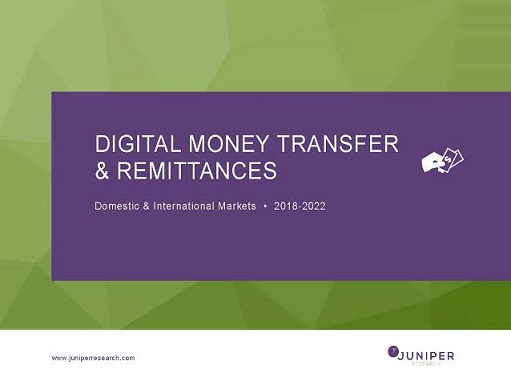 Growth of 93% over Next 5 Years
Growth of 93% over Next 5 Years
A new study from Juniper Research found that the global domestic money transfer transaction value will exceed $3.5 trillion by 2024, up from $1.8 trillion in 2019.
The new research, Digital Domestic Mobile Transfer: Key Trends, Player Innovation & Market Forecasts 2019-2024, found that mobile transactions will drive growth; accounting for 86% of total value in 2024. The research found that in emerging markets, service rollouts by mobile network operators are pushing growth, via mobile money solutions. Juniper Research therefore recommends that financial institutions should proactively engage with operators to access important future revenue streams.
Mobile Money Displacing Cash in Emerging Markets
The new research found that digital money transfer is now a compelling alternative to cash in emerging markets, enabled by high mobile penetration; reaching 84% of the population in Africa & Middle East by 2024. This allows mobile network operators to capitalise on low banking penetration; boosting financial inclusion and digitising highly cash-dependent economies.
Research author Nick Maynard explained: “The high rate of mobile penetration across the world makes mobile a uniquely effective way to access potential users, particularly those that are unbanked. This access will enable money transfer vendors to roll out a wealth of financial services, based around a core money transfer offering”.
Social Payments Crucial Battleground in US
The research also found that the rise of social payments in the US will be a major contributing factor to the 280% increase in domestic money transfer values in the country over the next five years. Venmo has become a popular solution in the US based on a strong social element. Facebook Pay’s recent launch is also an attempt to capitalise on social payments, by integrating Facebook’s previously disparate payments’ ecosystem..
However, with recent criticism of Facebook-backed Libra, any attempt by Facebook to become a major player in the payments ecosystem will be met by increased regulatory scrutiny, which may outweigh the potential benefits.


